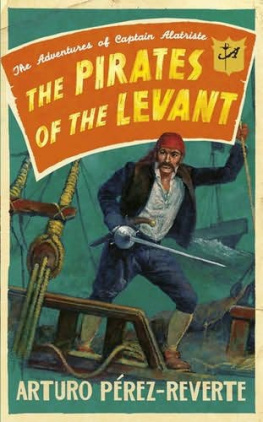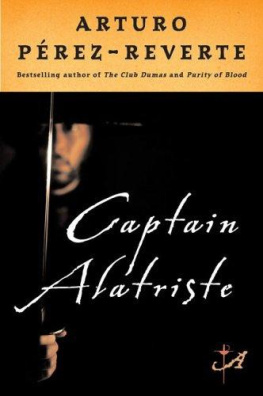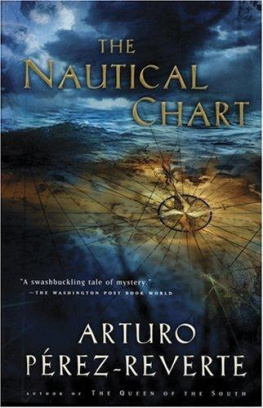Arturo Perez-Reverte - Pirates of the Levant (Captain Alatriste, Book 6)
Here you can read online Arturo Perez-Reverte - Pirates of the Levant (Captain Alatriste, Book 6) full text of the book (entire story) in english for free. Download pdf and epub, get meaning, cover and reviews about this ebook. year: 2010, publisher: Putnam Adult, genre: Adventure. Description of the work, (preface) as well as reviews are available. Best literature library LitArk.com created for fans of good reading and offers a wide selection of genres:
Romance novel
Science fiction
Adventure
Detective
Science
History
Home and family
Prose
Art
Politics
Computer
Non-fiction
Religion
Business
Children
Humor
Choose a favorite category and find really read worthwhile books. Enjoy immersion in the world of imagination, feel the emotions of the characters or learn something new for yourself, make an fascinating discovery.
- Book:Pirates of the Levant (Captain Alatriste, Book 6)
- Author:
- Publisher:Putnam Adult
- Genre:
- Year:2010
- Rating:4 / 5
- Favourites:Add to favourites
- Your mark:
- 80
- 1
- 2
- 3
- 4
- 5
Pirates of the Levant (Captain Alatriste, Book 6): summary, description and annotation
We offer to read an annotation, description, summary or preface (depends on what the author of the book "Pirates of the Levant (Captain Alatriste, Book 6)" wrote himself). If you haven't found the necessary information about the book — write in the comments, we will try to find it.
Arturo Perez-Reverte: author's other books
Who wrote Pirates of the Levant (Captain Alatriste, Book 6)? Find out the surname, the name of the author of the book and a list of all author's works by series.
Pirates of the Levant (Captain Alatriste, Book 6) — read online for free the complete book (whole text) full work
Below is the text of the book, divided by pages. System saving the place of the last page read, allows you to conveniently read the book "Pirates of the Levant (Captain Alatriste, Book 6)" online for free, without having to search again every time where you left off. Put a bookmark, and you can go to the page where you finished reading at any time.
Font size:
Interval:
Bookmark:
PIRATES OF THE LEVANT
ARTUROPEREZ-REVERTE
Translated from the Spanish by Margaret JullCosta
Chapter 1.THE BARBARY COAST
Chasingafter a ship makes for a long pursuit, and I swear to God this one had testedour patience to the limit. Our mood was little improved by having spent anafternoon, a moonlit night and a whole morning following our prey over abuffeting sea, which, every now and then, shook the galley's fragile frame withits blows. With her two taut sails aloft, the oars stowed and galley-slaves,soldiers and sailors all sheltering as best we could from the wind and thespray, the Mulata, a twenty-four-bank galley, had travelled nearlythirty leagues after the Berber galliot that we now finally had within range.As long as we didn't break a mast the older sailors kept glancing upanxiously she would be ours before the angelus.
'Tickleher arse!' ordered Don Manuel Urdemalas.
Our galley captain was standing in the stern hehad scarcely moved from the spot in the last twenty hours and from there hewatched as our first cannon shot plummeted into the water beside the galliot.When they saw how close the shot had come, the gunners and the men at the prow,standing round the cannon in the central gangway, all let out a cheer. Thingswould have to go very badly wrong for us to lose our prey now: it was withinour grasp and to leeward as well.
'They'reshortening their sail!' someone shouted.
The galliot's only sail, a vast canvas triangle,flapped in the wind as the crew rapidly brailed it in, lowering the mast.Rocked by the swell, the galliot showed us first its stern and then its port side, and that was when we got ourfirst proper look at it: it was a long, slender half-galley with thirteen banksand, we reckoned, a hundred or so men on board. It resembled one of thoselight, swift craft described by Cervantes:
The thief who hopes tostrike
And never yet he caught
Should move as fast aslightning
A hit, then home to port
Thegalliot had appeared to be nothing more than a sail to windward, but revealeditself to be a corsair when it brazenly approached the merchant convoy the Mulata was escorting, along withthree other Spanish galleys, between Cartagena and Oran. Under full sail, wehad gone after this fugitive white triangle and its stern which, little bylittle, and with the help of a south-westerly wind, grew larger as we closed inon her.
'The dogs are finallygoing to surrender,' said one soldier.
CaptainAlatriste was by my side, watching. With the mast lowered and the sail furled,the crew were bringing out the oars.
'No,' he murmured.'They're going to fight.'
Iturned towards him. He was screwing up his eyes against the dazzle of the sunand beneath the broad brim of his old hat, his eyes appeared even paler andgreener than usual. He was unshaven and, like everyone else, his skin was grimyand greasy from days spent at sea and the sleepless nights. He was intentlyfollowing the activities on the galliot: some men were running along the decktowards the prow, the oarsmen were turning the vessel, with those on one siderowing in one direction, and those on the other the opposite.
'Itlooks as though they want to try their luck,' he added calmly.
Hepointed to the pennant fluttering at the top of our mainmast, indicating thedirection of the wind. During the chase, this had swung round from north-westto north northeast, and there it was staying for the moment. Only then did Iunderstand. The corsairs, realising that flight was impossible and having nodesire to surrender, were using the oars to position themselves to face intothe wind. Galleys and galliots alike had but one large cannon at the prow andshort- range pedreros stone-throwers along the sides. The crew of the galliot were not aswell-armed as we were, and there were fewer of them, but if they were preparedto play their last card, one lucky shot could unmast us or injure a good few ofour men. And using their oars meant they could manoeuvre the vessel despite theadverse wind.
'Lower both masts!Shirts off! Row!'
Itwas clear from the orders he gave, sharp as pistol shots, that CaptainUrdemalas had also understood. The two masts were quickly lowered, the sailsfurled, and the galleymaster took up his position in the central gangway, whipin hand.
'Comeon! Come on!' he urged, forcing the galley-slaves, bare-chested now, to taketheir places, four men per bank on either side and forty-eight oars in thewater while that son of a whore lashed their backs until they bled.
'Soldiers, to yourposts!'
Thedrum beat loudly while the soldiers, muttering the oaths, complaints andblasphemies typical of the Spanish infantry but also mumbling prayers,kissing medallions and scapulars and crossing themselves five hundred times padded the sides of the galley with mattresses and blankets to provide someprotection from enemy fire. They then equipped themselves with the tools of thetrade harquebuses, muskets and pedreros and took up theirplaces in the prow and in the corridors that ran along either side of thegalley above the oars. The slaves were already maintaining a good rhythm whilethe galleymaster and under-galleymaster used their whistles to mark time andgaily flailed at their backs. From prow to stern, the match-cords ofharquebuses were starting to smoke.
Istill lacked the strength needed to use a harquebus or a heavy musket on boardship; we Spaniards took aim by holding the sight to one eye, and if your handsweren't strong enough to cope with the rolling motion of the galley, the recoilcould dislocate your shoulder or knock out your teeth. So I took up my pike andmy sword a short, broad one because a long sword was too cumbersome on deck tied a kerchief tightly round my head and, thus armed, followed CaptainAlatriste. As an experienced, trustworthy soldier, my master well, he wasn'tmy master any more, but old habits die hard took up his position in thebulwarks, the very position, ironically enough, that good Don Miguel de Cervanteswas given on the Marquesa during the Battle of Lepanto. Once we had taken ourplaces, the Captain glanced at me distractedly and, smiling only with his eyes,he smoothed his moustache.
'Yourfifth naval battle,' he said, then blew on the lit match-cord of his harquebus.His tone was suitably cool, but I knew that he was as worried about me as hehad been on the four previous occasions, even though I had just turned seventeen or perhaps because of that. When it came to boarding an enemy ship, not evenGod recognised his own.
'Don't board the galleyunless I do, agreed?'
Iopened my mouth to protest, but, at that moment, there was a loud report at theprow, and the first cannon shot from the enemy galliot sent splinters as sharp as knives flyingacross the deck.
It was a long road that had led the Captain andmyself to be on boardthat galley, which, on that noontide at the end of May 1627 the dates are there among my yellowingser vice records was about to join battle with acorsair galliot just a few miles to the south of the island of Alboran, off theBarbary Coast.
CaptainAlatriste's head had been only inches away from the executioner's block following a dispute withPhilip IV o ver ashared mistress. However, after the disastrous affair o f the man in theyellow doublet, when our young Catholic monarch had only just survived a plotdreamed up by the Inquisitor Fray Emilio Bocanegra, the Captain had managed to preserve both life and reputation thanks to hissword. With more modest thanks to my sword and that of the actor Rafael de Cozar, he had saved the royal skinduring a sham hunting party in El Escorial. Kings, however, are both ungrateful and forgetful, and the incidentbrought us no further reward. Moreover, the Captain had twice crossed swordsand words with the Count of Guadalmedina, the royal confidant, over the King'sdalliance with the actress Maria de Castro. The first time left him with a cutto his cheek and the second with some painful bruises; andthe Count's affection for my master, which dated from Flanders and from Italy,had eventually turned to rancour. And so the El Escorial affair had brought us only enough tobalance our accounts.
Next pageFont size:
Interval:
Bookmark:
Similar books «Pirates of the Levant (Captain Alatriste, Book 6)»
Look at similar books to Pirates of the Levant (Captain Alatriste, Book 6). We have selected literature similar in name and meaning in the hope of providing readers with more options to find new, interesting, not yet read works.
Discussion, reviews of the book Pirates of the Levant (Captain Alatriste, Book 6) and just readers' own opinions. Leave your comments, write what you think about the work, its meaning or the main characters. Specify what exactly you liked and what you didn't like, and why you think so.










